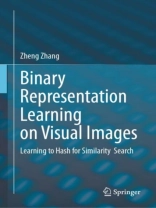This book introduces pioneering developments in binary representation learning on visual images, a state-of-the-art data transformation methodology within the fields of machine learning and multimedia. Binary representation learning, often known as learning to hash or hashing, excels in converting high-dimensional data into compact binary codes meanwhile preserving the semantic attributes and maintaining the similarity measurements.
The book provides a comprehensive introduction to the latest research in hashing-based visual image retrieval, with a focus on binary representations. These representations are crucial in enabling fast and reliable feature extraction and similarity assessments on large-scale data. This book offers an insightful analysis of various research methodologies in binary representation learning for visual images, ranging from basis shallow hashing, advanced high-order similarity-preserving hashing, deep hashing, as well as adversarial and robust deep hashing techniques. These approaches can empower readers to proficiently grasp the fundamental principles of the traditional and state-of-the-art methods in binary representations, modeling, and learning. The theories and methodologies of binary representation learning expounded in this book will be beneficial to readers from diverse domains such as machine learning, multimedia, social network analysis, web search, information retrieval, data mining, and others.
विषयसूची
Chapter 1. Introduction.- Chapter 2. Scalable Supervised Asymmetric Hashing.- Chapter 3. Inductive Structure Consistent Hashing.- Chapter 4. Probability Ordinal-preserving Semantic Hashing.- Chapter 5. Ordinal-preserving Latent Graph Hashing.- Chapter 6. Deep Collaborative Graph Hashing.- Chapter 7. Semantic-Aware Adversarial Training.- Index.
लेखक के बारे में
Zheng Zhang is a full Professor at School of Computer Science and Technology, Harbin Institute of Technology, Shenzhen, China. He is the deputy director of the Shenzhen Key Laboratory of Visual Object Detection and Recognition, Shenzhen, China. Dr. Zhang’s research interests mainly focus on multimedia content analysis and understanding, especially multimedia retrieval, multi-modal learning, and big data mining. He has published more than 100 technical papers in prestigious international journals and conference proceedings, with over 7, 000 citations according to Google Scholar (h-Index: 40). He is a co-recipient of paper awards in ACM Multimedia Asia’21, EAI ICMTEL’22, and SMARTCOMP’14. He was the recipient of the CAAI Outstanding Young Research Achievement Award and has also been featured in the ‘World’s Top2% Scientists’ for consecutive years. He serves as the Editorial Board Member of IEEE Trans. on Affective Computing (IEEE TAC), IEEE Journal of Biomedical and Health Informatics (IEEE JBHI), and Elsevier Information Fusion (INFFUS), as well as the Area Chair of ICML, CVPR, ACM MM, and others. He is an IEEE and CCF Senior Member.












